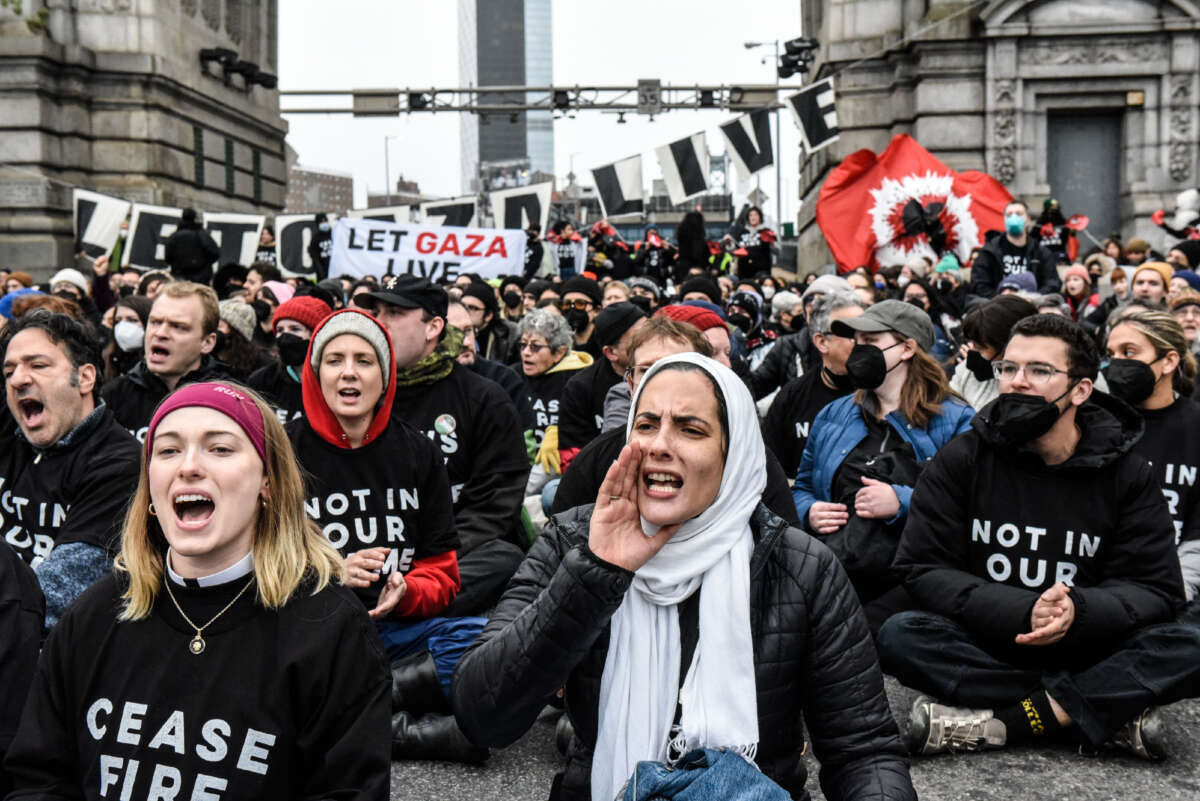Did you know that Truthout is a nonprofit and independently funded by readers like you? If you value what we do, please support our work with a donation.
Across 15 university campuses in the U.S. on Friday at sunset, Jewish students are planning to gather for the holy day of Shabbat in order to protest and call for an end to Israel’s genocidal assault of Gaza.
At the gatherings, organized by Jewish Voice for Peace and other Jewish student groups, students will protest or gather to pray, sing and generally mark the beginning of the Sabbath, depending on the campus. As with the wave of protests that have swept the country and many parts of the world in recent months, the students are calling for a ceasefire in Gaza, using their voices as members of anti-Zionist Jewish communities.
Campuses that will be participating are Claremont Colleges, Clark University, Columbia/Barnard University, Haverford/Bryn Mawr College, Massachusetts Institute of Technology, Northwestern University, Oberlin College, Princeton University, Stanford University, University of California Los Angeles, University of California Santa Barbara, University of Chicago, University of Washington, and Western Washington University, according to a Jewish Voice for Peace press release.
“Shabbat is a time for the community to come together to reflect and celebrate, but in institutional Jewish spaces, Shabbat’s powers are lost as leaders express unwavering support for genocide,” said Evgeny Stolyarov, a member of Northwestern’s Jewish Voice for Peace chapter, in a statement to Truthout. “Anti-Zionist shabbats restore the power of a peaceful and reflective shabbat, where we can gather as Jews and connect to our tradition of peace and resistance.”
The gatherings are being held at sundown, which marks the beginning of the Jewish Sabbath, traditionally a day of holiness and rest. A number of Jewish groups advocating for Palestinian rights and a ceasefire, including Rabbis 4 Ceasefire, IfNotNow, Center for Jewish Nonviolence, and others have also participated in Shabbat for Ceasefire events in the past.
“Hosting a Shabbat for Ceasefire allows these students to honor their tradition, gather in community, and affirm their commitment to a ceasefire and Palestinian freedom,” said Jewish Voice for Peace media coordinator Liv Kunins-Berkowitz. “It is said that on Shabbat we get a taste of the Olam Haba, the world to come. For anti-Zionist Jews, the world to come includes thriving Jewish communities and Palestinian freedom.”
Gathering on the holy day has a special spiritual significance for many Jewish advocates for a ceasefire, and Kunins-Berkowitz said many anti-Zionist Jewish students have been “pointedly disinvited” to institutional Jewish spaces on campus due to their stance against Israel’s genocide.
“Shabbat reminds us again and again of what is important, reminds us to say thank you for what we have, and gives us a moment for rest to keep the work ahead of us sustainable. As Jews at University of Washington … we turn to this weekly ritual to connect to our hearts and our community and our ancestors, and to cultivate that strength towards the important work ahead of us today,” said Joe, a Jewish Voice for Peace member at the University of Washington, who asked to only use his first name. “Palestinian Liberation is inextricably linked and deeply connected to Jewish safety and wellbeing. We won’t feel free, as Jews, until our Palestinian siblings are free.”
A terrifying moment. We appeal for your support.
In the last weeks, we have witnessed an authoritarian assault on communities in Minnesota and across the nation.
The need for truthful, grassroots reporting is urgent at this cataclysmic historical moment. Yet, Trump-aligned billionaires and other allies have taken over many legacy media outlets — the culmination of a decades-long campaign to place control of the narrative into the hands of the political right.
We refuse to let Trump’s blatant propaganda machine go unchecked. Untethered to corporate ownership or advertisers, Truthout remains fearless in our reporting and our determination to use journalism as a tool for justice.
But we need your help just to fund our basic expenses. Over 80 percent of Truthout’s funding comes from small individual donations from our community of readers, and over a third of our total budget is supported by recurring monthly donors.
Truthout has launched a fundraiser to add 432 new monthly donors in the next 7 days. Whether you can make a small monthly donation or a larger one-time gift, Truthout only works with your support.
